Books
Books
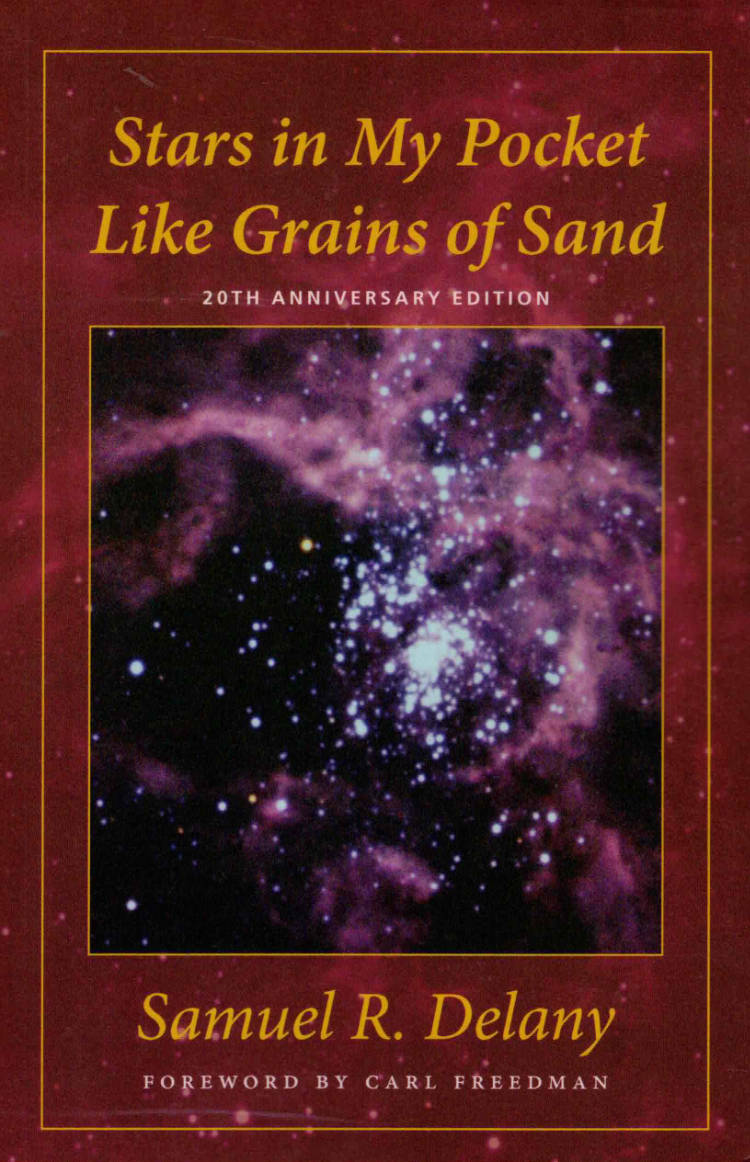
Stars in My Pocket Like Grains of Sand
The story of a truly galactic civilization with over 6,000 inhabited worlds.
Stars in My Pocket Like Grains of Sand is a science fiction masterpiece, an essay on the inexplicability of sexual attractiveness, and an examination of interstellar politics among far-flung worlds. First published in 1984, the novel's central issues—technology, globalization, gender, sexuality, and multiculturalism—have only become more pressing with the passage of time.
The novel's topic is information itself: What are the repercussions, once it has been made public, that two individuals have been found to be each other's perfect erotic object out to "point nine-nine-nine and several nines percent more"? What will it do to the individuals involved, to the city they inhabit, to their geosector, to their entire world society, especially when one is an illiterate worker, the sole survivor of a world destroyed by "cultural fugue," and the other is—you!
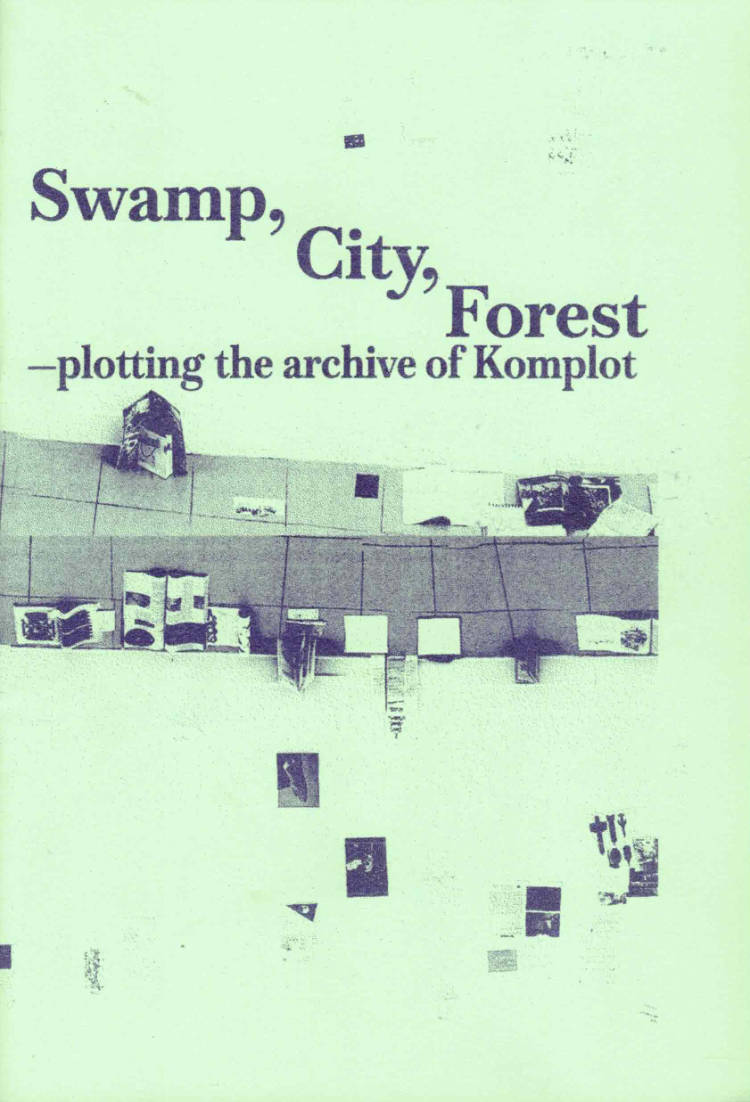
Swamp, City, Forest
This zine is the result of the research residency "Plotting with the archive" that took place at Komplot between September 2025 and January 2026. The publication contains a subjective timeline of Komplot — its strategies, relations and projects — with the aim of organising them and at the same time speculating on possible future developments. The material was produced during a collective workshop in which the archive was explored and activated.
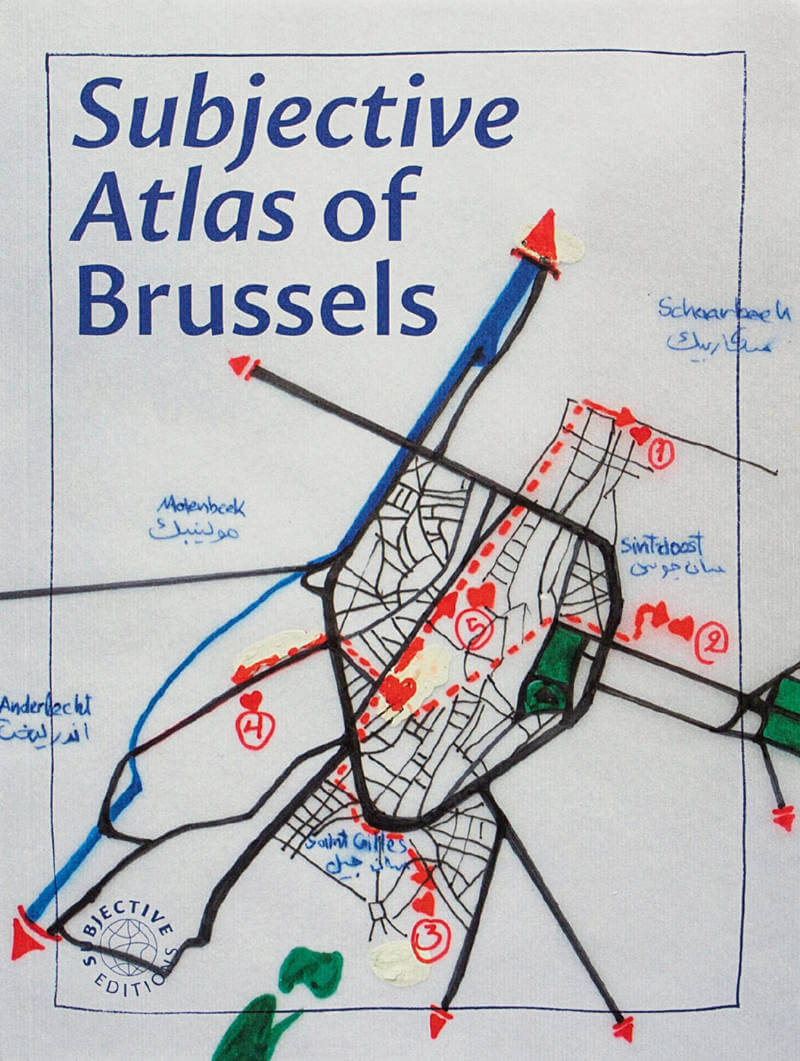
Subjective Atlas of Brussels
Brussels is an amalgam of juxtapositions: a place that inspires you to dream away on sultry summer nights before hitting you with its rough reality the next day. It is a city that you slowly fall in love with until you can no longer imagine wanting to live anywhere else. However, it’s a special kind of love, a kind of love that keeps you critical, a kind of love that keeps you questioning the space that you inhabit as you wonder how we as a community can do better.
This Subjective Atlas of Brussels showcases the work of designers, artists and other creative minds who all share this kind of love for Brussels, depicting the diverging narratives and histories of different spaces, allowing us to dwell on the fascinating snapshots that make up this great metropolis. Discover how more than 80 Brusseleirs have mapped what this capital means for them at this moment in time.
EDITORIAL TEAM: Petra van Brabandt, Margrit Coppé, Lisemarie van Loon (intern), Erika Sprey, Kurt Vanbelleghem
INTRODUCTION: Melat Gebeyaw Nigussie
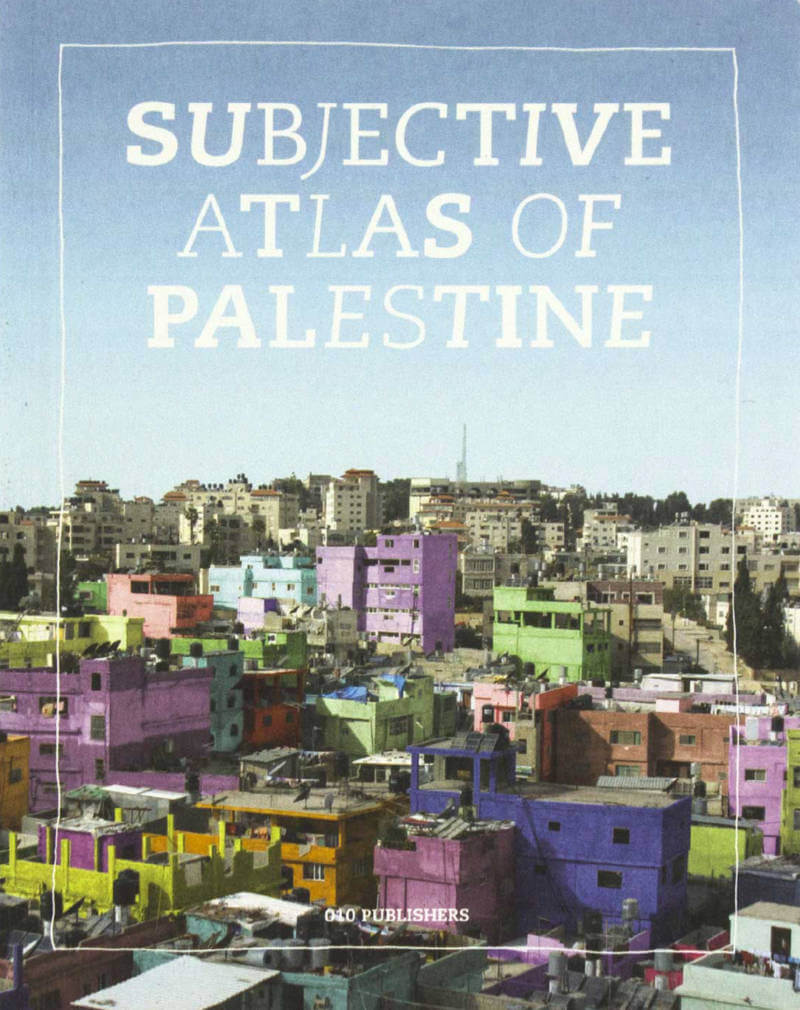
Subjective Atlas of Palestine
Sublime landscapes, tranquil urban scenes, frolicking children; who would associate these images with Palestine? All too often the Western media show the country’s gloomy side, and Palestinians as aggressors. It is this that makes identifying with them virtually impossible. If we are to relate to the Palestinians other images are needed, images seen from a cultural and more human vantage point.
Palestinian artists, photographers and designers have mapped their country as they see it. Given their closeness to the subject, this has resulted in unconventional, very human impressions of the landscape and the architecture, the cuisine, the music and the poetry of thought and expression. The drawings, maps and photographs reveal individual life experiences. The contributions give an entirely different angle on a nation in occupied territory. In this subjective atlas it is the Palestinians themselves who show the disarming reverse side of the black-and-white image generally resorted to by the media.
CURATOR: Khaled Hourani (International Academy of Arts Palestine)
CONTRIBUTORS: Sameh Abboushi, Majd Abdel Hamid, Senan Abdelqader, Mohammed Amous, Tayseer Barakat, Sami Bandak, Baha Boukhari, Mahmoud Darwish (poem), Reem Fadda, Shadi Habib Allah, Majdi Hadid, Shuruq Harb, Dima Hourani, Khaled Hourani Munther Jaber, Khaled Jarrar, Abed Al Jubeh, Hassan Khader (foreword), Yazan Khalili, Suleiman Mansour, Basel Al Maqousi, Sani P. Meo, Inas Moussa, Hafez Omar, Hosni Radwan, Awatef Rumiyah, Ahmad Saleem, Shareef Sarhan, Majed Shala, Sami Shana’ah, Maissoon Sharkawi, Mamoun Shrietch, Lena Sobeh, Mohanad Yaqubi, Inass Yassin
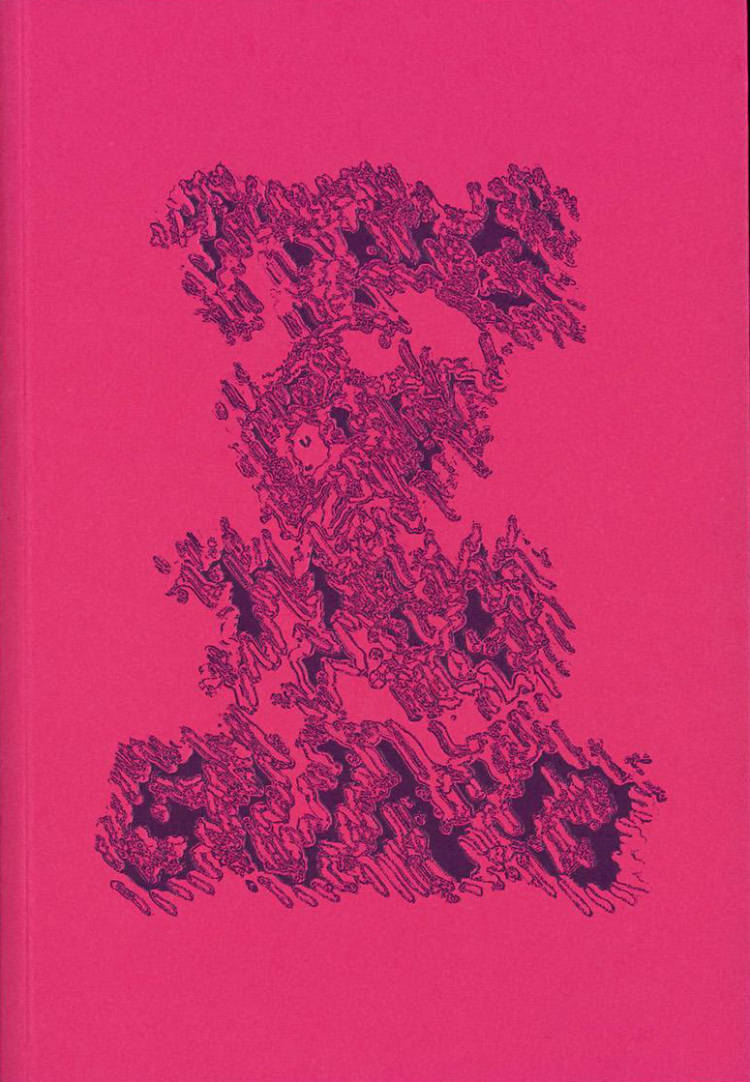
Tips of the sung
Tips of the Sung is a collection of interdisciplinary texts from Samuel Brzeski composed over the five years whilst he was Associate Artist at Lydgalleriet. The collection brings together performance scripts for voice and video with newly composed texts for the page. Centring on the vibrations of the voice, the texts exist somewhere between signification and delirium, at times making more sound than sense.
The texts are full of bumbling mumbles, meandering hums, homophones, inner voices, affirmations, motivations, subvocalisations, resolutions, errors in speech production, peach seduction, car maintenance manuals, self-help fallacies, roomy echo chambers, overheard language lessons, morning meditations, and other forms of verbal rehearsal at the limits of language.
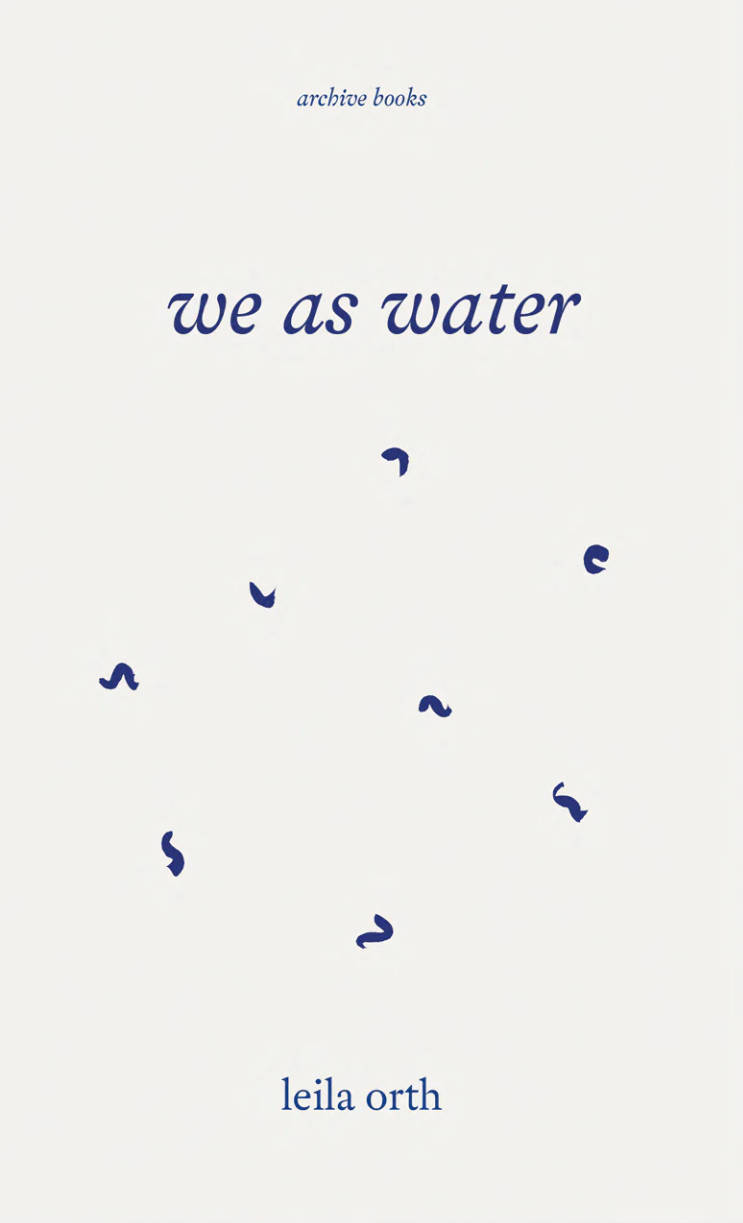
we as water
“Water has the power to connect us, reflects the relationship between past and present and provides space for narratives that have previously been overlooked."
In her book we as water, Leila Orth explores water as a site of memory, weaving together the stories of eight people who tell of oceans, rivers, and lakes and their own memories. Building on her many years of artistic engagement with memorials, Leila Orth uses the book to search for places, far removed from national memorials, that lead to a possible transnational form of remembrance. Water becomes a transnational site of memory, where layered stories and perspectives intertwine. It holds the traces of travellers and the drowned, the sand at the bottom of the seas, the history of the islands and coastlines where we grew up. It recalls our families, our longings, the past, the fighters, the dead, and the living.
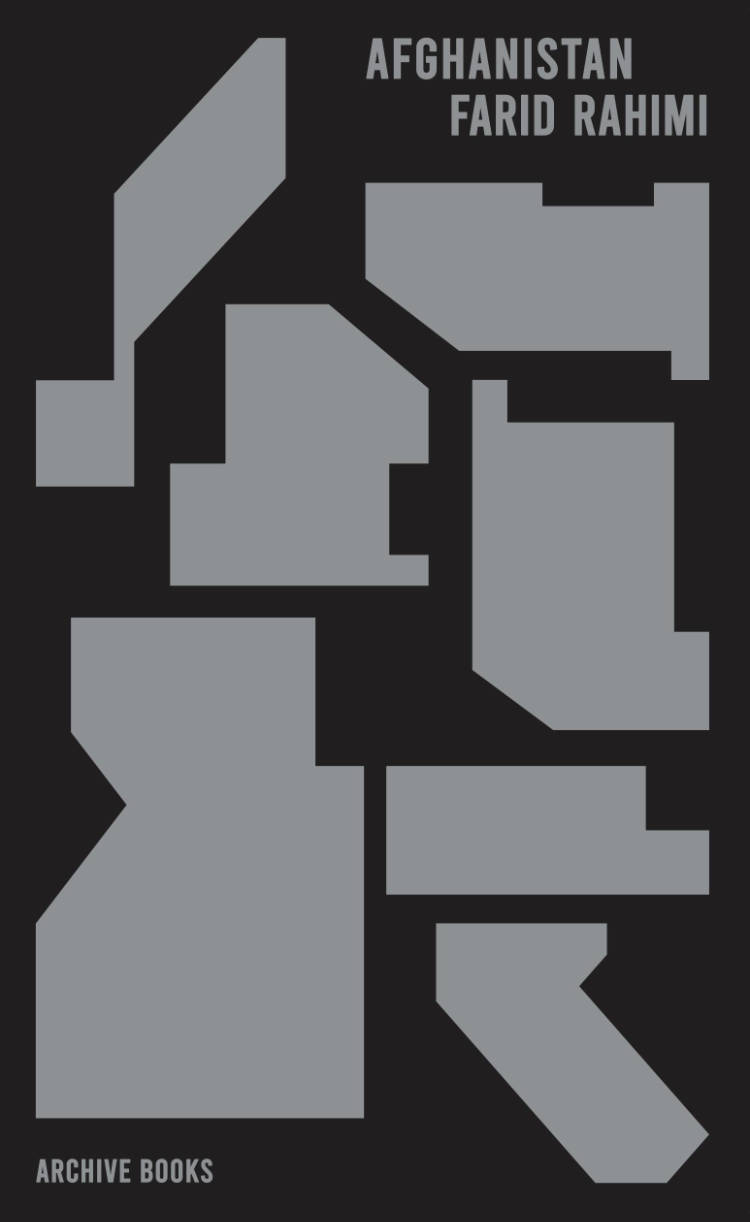
Afghanistan
Afghanistan is my father’s homeland. He was born in Kabul in 1945 and later moved first to France, then to Switzerland in the 1970s. In my mind, Afghanistan exists as a geography with blurred edges, something I feel the need to reconcile with. It’s a place I’ve only ever known through stories, a source of memories that, over time, have shifted and become distorted.
Contributors: Luca Cerizza, Farid Rahimi, Said Rahimi, Susanna Ravelli, Francesca Recchia, Zafar Sayan, and Dawood Tawana
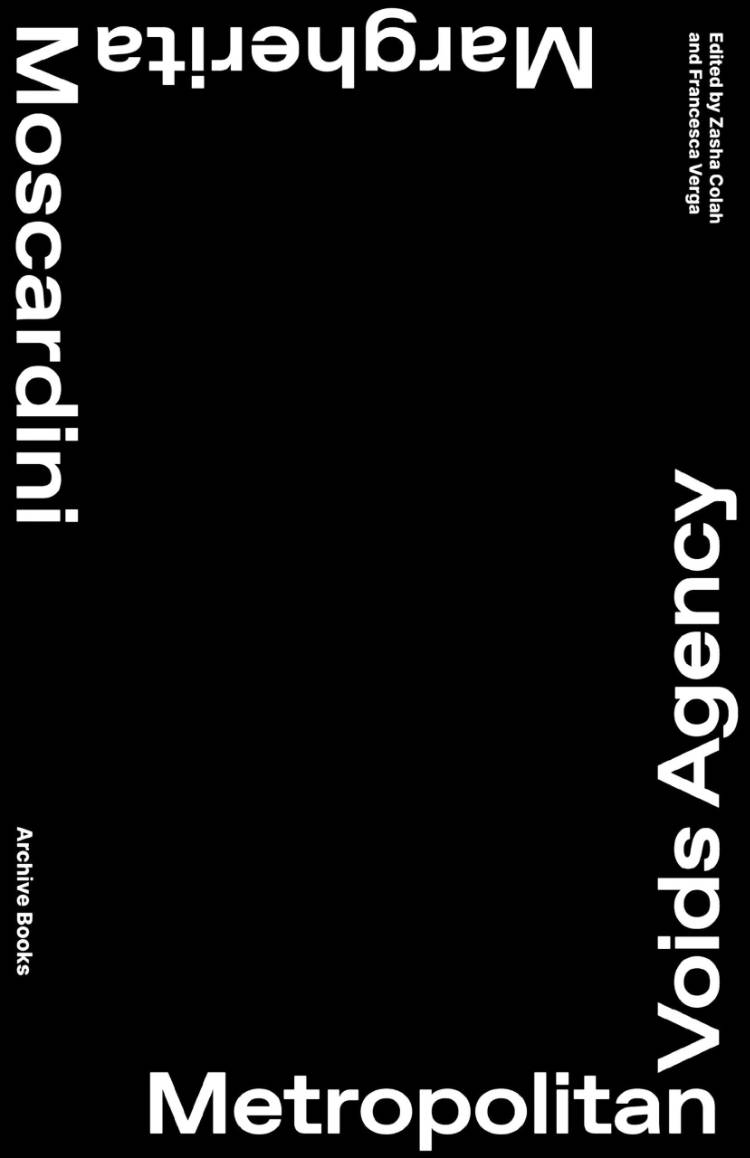
Metropolitan Voids Agency
Metropolitan Voids Agency is the first monographic publication dedicated to the collected works of artist Margherita Moscardini. The book recounts the work carried out by Moscardini spanning seventeen years, between 2008 and 2024, inviting a reading of her practice in its entirety as an investigation into ‘urban voids’: those which Moscardini has recognized and designated as voids, or those she has herself invented in the urban fabric.
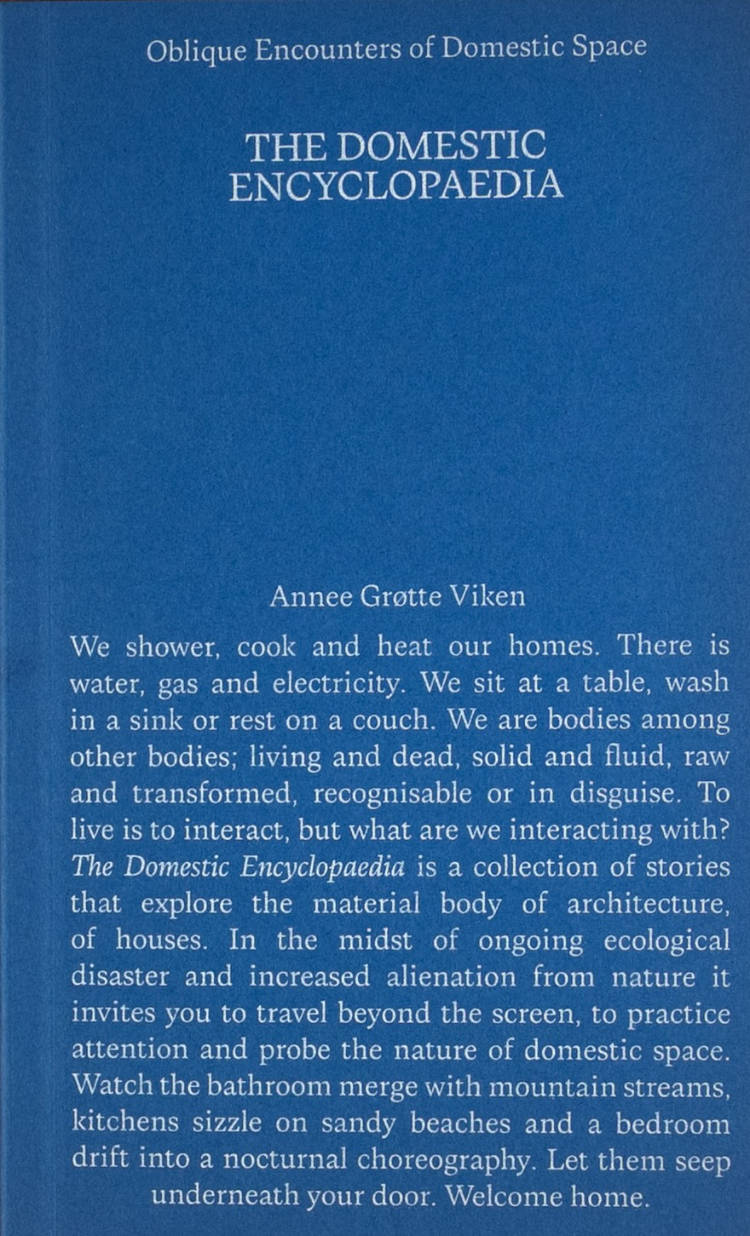
The Domestic Encyclopaedia
The Domestic Encyclopaedia is a collection of stories that explore the material body of architecture, of houses. In the midst of ongoing ecological disaster and increased alienation from nature it invites you to travel beyond the screen, to practice attention and probe the nature of domestic space.
Watch the bathroom merge with mountain streams, kitchens sizzle on sandy beaches and a bedroom drift into a nocturnal choreography.
Let them seep underneath your door.
Welcome home.
In this encyclopedia of domestic space Annee Grøtte Viken enters in a dialogue with the conventional spaces that surround us, the semiotic skin we call home. She uses her first love, literature, to imagine and give voice to the seemingly mute spaces we inhabit, collecting bits and pieces from the western canon and non-western counter-canon, to find characters lying in bath, dreaming in bed, cooking in kitchens. By each time articulating the imagined voices of these spaces, she embarks on a poetic journey into the home, this drifting island.
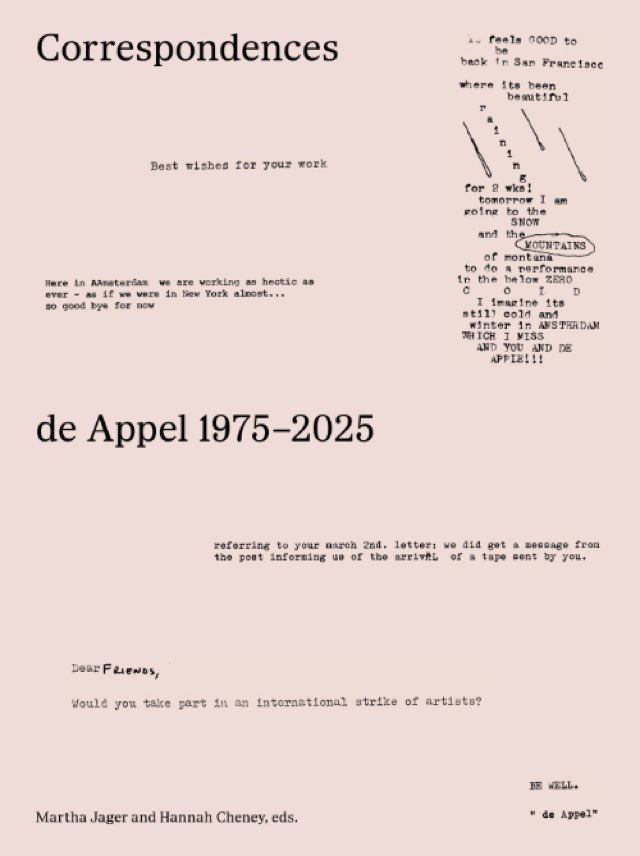
Correspondences de Appel 1975–2025
This volume brings together 50 years of correspondence from the archive of de Appel contemporary arts centre in Amsterdam. In tracing a relational and affective history of the institution, each piece offers a glimpse into the artistic projects and programmes de Appel has commissioned and championed; the cultural shifts and careers it has nurtured; the celebrations and struggles it has weathered; and the collaborations and friendships sparked along the way. The book gathers materials from more than 100 voices, with paper and digital exchanges covering an intricate web of people, places, and events, ultimately coalescing into what can be perceived as the unified work of an institution.
Includes a light-blue satin Ribbon by Alison Knowles.
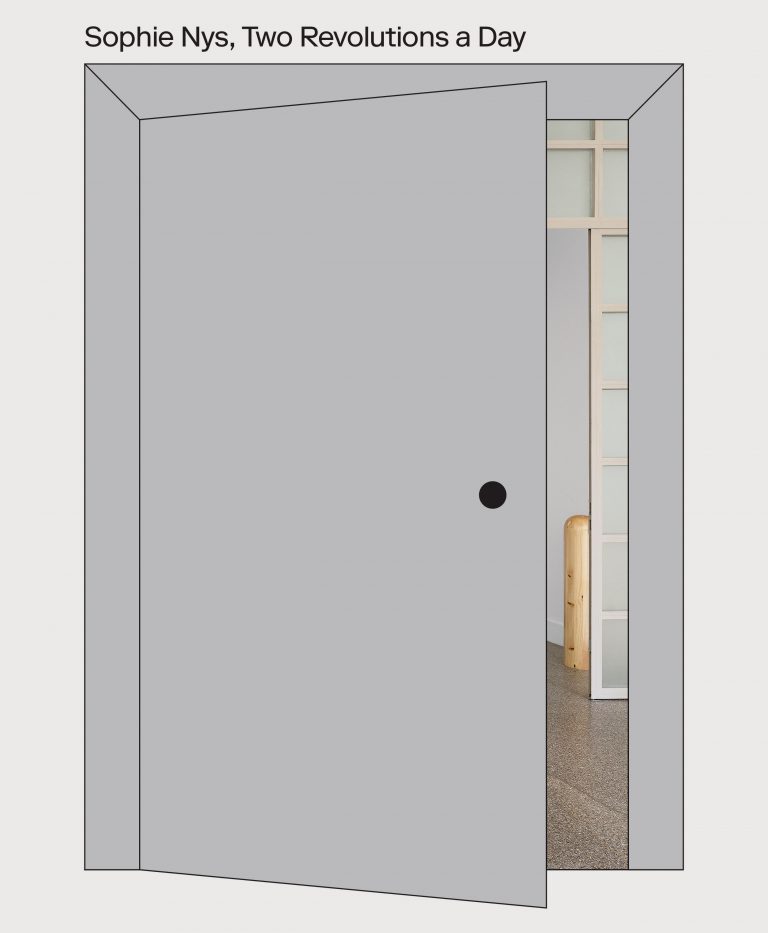
Two Revolutions a Day
Two Revolutions a Day marks the first in-depth publication devoted to the work of Sophie Nys, whose artistic practice over the past two decades has unfolded through an enterprising interplay of research, observation, and formal experimentation. Moving between exhibition-making, design, and subtle acts of re-framing, Nys has developed an oeuvre that resists fixed categories while remaining acutely attentive to the structures – historical, linguistic, psychological – that shape how meaning is produced and circulated.
Rather than presenting a linear retrospective, Two Revolutions a Day is organised as an extended conversation between Nys and critic Christophe Van Gerrewey that mirrors the artist’s own methods. Together, they revisit key works and exhibitions from the early 2000s to today, tracing recurring motifs and questions while allowing contradictions and shifts in perspective to remain visible.
Throughout the book, Nys’s fascination with systems of power and authority intersects with a sensitivity to intimacy, subjectivity, and the everyday, engaging with feminist perspectives that examine the politics of representation. Historical figures, marginal anecdotes, and overlooked documents appear alongside reflections on resistance, collaboration, design, and the conditions under which artworks –and the social roles they inhabit – come into being. Language, in particular, emerges as both material and problem: a tool that promises clarity while constantly slipping, misfiring, or revealing its own limits.

Tosquelles: Healing Institutions
[Available for preorders. Shipping 12 March]
Having fled to France in the aftermath of the Spanish Civil War, the Catalan psychiatrist Francesc Tosquelles joined the Saint-Alban psychiatric hospital, where he carried out a transformative clinical practice for over twenty years, in part under the Vichy regime.
Saint-Alban was an extraordinary event, a commune, an informal refuge in a time of extreme danger, a sort of upwelling spread through word of mouth. Those entering the asylum were welcomed, and that welcome never stopped. Care happened through a broad range of communal activities for staff and patients: theater, cinema, collective writing, horticulture, the sorting of colored pearls, gymnastics, singing, a monthly newspaper. The dignity of every patient was of foremost importance.
Now, as then, warmongers are willing to poison and slaughter without blinking, making all of life difficult if not impossible: the pull of such asylums is obvious. Tosquelles is a ground-breaking record of the life and work of the founder of institutional psychotherapy. Assembled by Joana Masó, with many texts translated to English for the first time, it is a direct encounter with Tosquelles’s clinical, intellectual, and political writings.
“Tosquelles’s work serves as a model for dismantling capitalist institutions, a revolutionary venture whose essence Joana Masó captures.”
Paul B. Preciado
“This remarkable collection allows us to experience the genius of Tosquelles in all its dimensions for the first time. We accompany him through his early work in Reus and Barcelona, the development of his therapeutic ideas and inventive practices in war-torn Catalonia and in exile at the Septfonds Camp, his legendary years at Saint Alban and his lesser-known later years in Melun, Nouvelle Forge and La Candélie. Joana Masó guides us to the creative heart of a man whose counter-cultural, counter-intuitive thinking excited generations of intellectuals in France and now inspires the world.”
Rosie Stockton
“Resistance hero, anti-Stalinist Marxist, Surrealist, revolutionary practitioner of social therapy, mentor to Frantz Fanon: Francesc Tosquelles was one of the most innovative thinkers in modern psychiatry, a visionary whose moment may finally have arrived.”
Adam Shatz
With texts by Francesc Tosquelles, trans. Robert Hurley and Mara Faye Lethem
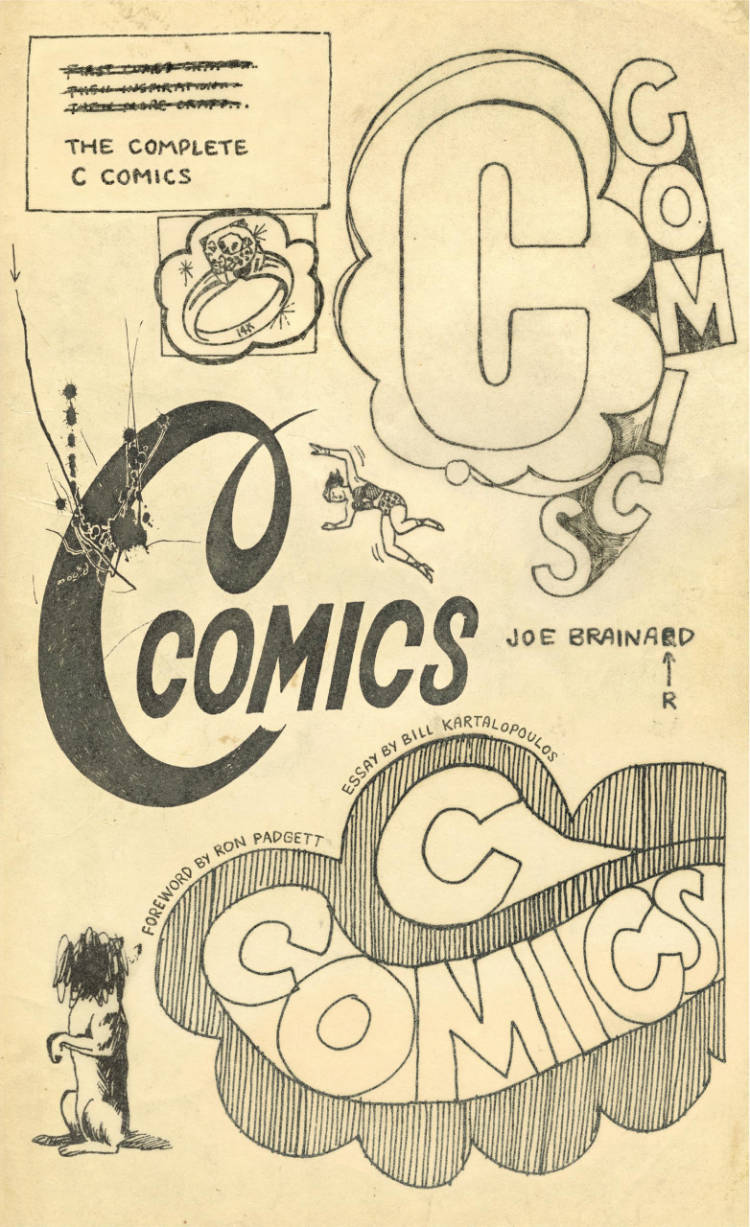
The Complete C Comics
In the mid-1960s, legendary artist and writer Joe Brainard (I Remember) teamed with poets such as John Ashbery, Frank O’Hara, Barbara Guest, Ron Padgett, Kenneth Koch, Ted Berrigan, and many more for these pioneering collaborative comic strips—unavailable for decades and collected here for the first time.
“PEOPLE OF THE WORLD… RELAX!”
In the creative hotbed of 1960s New York, Joe Brainard was a whirlwind. He was a maker of paintings, assemblages, collages, book covers, poetry-reading flyers, and more. But some of his most exciting work was done with his friends. In 1964, the twenty-two-year-old Brainard turned his talents to rewiring the lowly comic book form into something new and surprising. He invited his friends Frank O’Hara, Ted Berrigan, John Ashbery, Kenneth Koch, Peter Schjeldahl, Barbara Guest, Ron Padgett, and others—all of them New York School poets—to collaborate with him on comics that they would write and he would draw.
The results were unlike any comics seen before. Previously available only on the rare-book market (at very high prices) but available here under one cover for the first time, the two issues of C Comics still feel as fresh as when the first page rolled off the mimeograph machine more than sixty years ago. Brainard’s energetic line and joyful humor charge across every page, illustrating O’Hara’s recasting of a cowboy as a mash-note-writing lover, Padgett’s experiments with traditional cartoon sound effects (ROAR! GRRR! SKREE!), cameos by Ernie Bushmiller’s Nancy, and heaps of Dadaesque delights.
This edition includes a foreword from Padgett and an essay by comics historian Bill Kartalopolous, who details the creation (and creators) of C Comics. A masterpiece of collaboration and spontaneity, C Comics is a testament to the vastness of Brainard’s creativity and his ability to push any artistic form in a new and powerful direction.
Foreword by Ron Padgett
Contributions by Bill Kartalopoulos
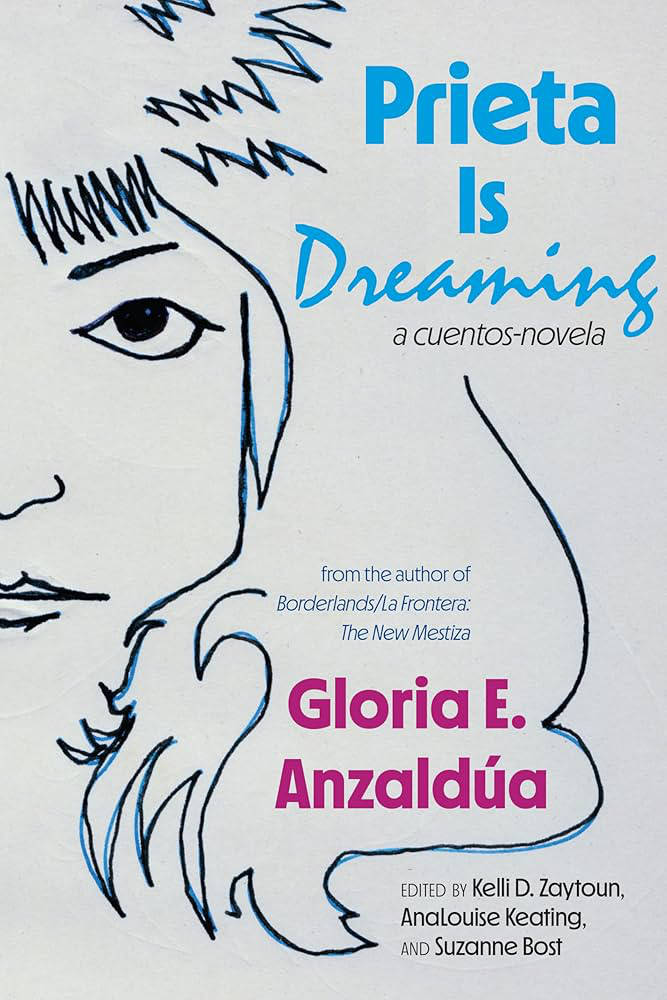
Prieta Is Dreaming: A cuentos-novela
A generative, genre-bending collection of nineteen intertwined stories by legendary writer, theorist, and activist Gloria E. Anzaldúa.
Best known for Borderlands/La Frontera: The New Mestiza (1987), Gloria E. Anzaldúa was also a prolific fiction writer. Prieta Is Dreaming, a speculative novel-in-stories, follows the precocious Prieta from her childhood in South Texas to college and beyond as she tries to find her way in the world. Imbued with supernatural powers, Prieta traverses time, changes form, explores her desires, and defies convention. Started in the 1970s and revised up until Anzaldúa's death in 2004, Prieta Is Dreaming comes as a revelation, affirming Anzaldúa's place at the forefront of contemporary feminist, queer, and border theory, while transforming what we think about both her writing and ourselves. In these nineteen intertwined stories, we find some of Anzaldúa's most adventurous, inspired ideas about gender, sexuality, and the very nature of existence—as well as a character, la Prieta, as bold and memorable as the book itself.
Gloria E. Anzaldúa (1942–2004) was a poet, metaphysical philosopher, and scholar of Chicana cultural theory, feminist theory, and queer theory. Her books include Borderlands/La Frontera: The New Mestiza and Light in the Dark/Luz en lo oscuro: Rewriting Identity, Spirituality, Reality. She was coeditor, with Cherríe Moraga, of This Bridge Called My Back: Writings by Radical Women of Color, the 40th anniversary edition of which was also published by SUNY Press. Kelli D. Zaytoun is Professor of English Language and Literatures at Wright State University. She is the author of Shapeshifting Subjects: Gloria Anzaldúa's Naguala and Border Arte. AnaLouise Keating is Professor of Multicultural Women's and Gender Studies at Texas Woman's University. She is the author, editor, or coeditor of many books, including most recently The Anzaldúan Theory Handbook. Suzanne Bost is Professor and Chair of the Department of English at Loyola University, Chicago. She is the author of four monographs, the most recent being Quiet Methodologies: Humility in the Humanities.
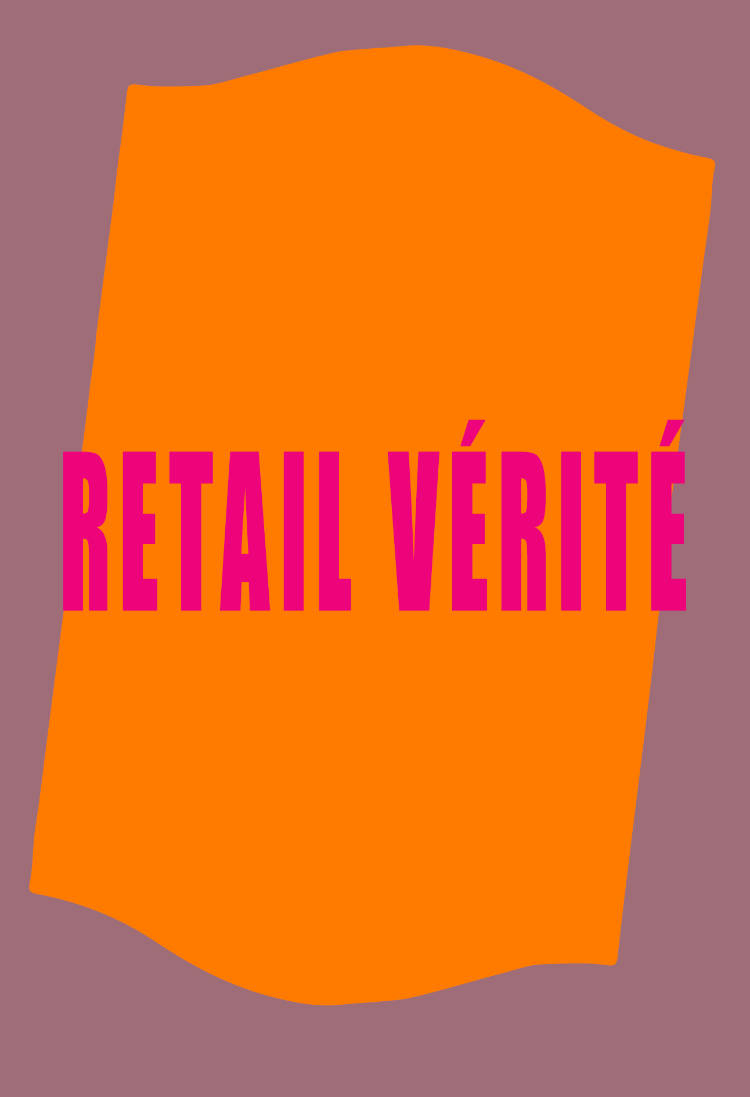
Retail Vérité
Once upon a time there was a shopping center just off Dam Square, a stone’s throw from the Madame Tussauds, not far from Primark, two streets across De Bijenkorf overshadowing the Magna Plaza, and just a couple doors down the Royal Palace in the middle of Amsterdam. It was the place where drag queen Tuu Lipa performed and Yeung sold eau de car engine oil. It was also where Mr. R looked for his human lover, where Inez became a millionaire, and where Yahoo launched its metaverse. “Welcome to the YAniverse,” greeted the Yahoo assistant…
Retail Vérité is the outcome of writing workshops organized by A Maior at San Serriffe. Through a blend of improvisation, larping and speed dating, the participants sketched characters and dialogues on-site.
This cohort featured Anouk Asselineau, Alva Bücking, Katherina Gorodynska, Chieri Higa, SeungJi Jo, Simon Marsiglia, Christina Ntanovasili, Young Eun Park, Ignacy Radtke, Matthew Senkowycz, Maja Simisic, Mehmet Süzgün, Simone Wegman, Bruno Zhu and others.
A Maior is a clothing and home goods store located in the outskirts of Viseu, Portugal. Since 2016, an eponymous exhibition program has taken place within the shopping environment. A Maior is managed by the staff, the artist Bruno Zhu and his family. A Maior has been featured in exhibitions at Melly, Rotterdam; Frans Hals Museum, Haarlem; Kunsthalle Freeport, Porto; X Museum, Beijing; Life Sport and BQ, both Berlin. In 2022, A Maior was the writer-in-residence at San Serriffe in Amsterdam, who commissioned Retail Verité, A Maior’s first novella.
With A Maior, Anouk Asselineau, Alva Bücking, Katherina Gorodynska, Chieri Higa, SeungJi Jo, Simon Marsiglia, Christina Ntanovasili, Young Eun Park, Ignacy Radtke, Matthew Senkowycz, Maja Simisic, Mehmet Süzgün, Simone Wegman, Bruno Zhu.
Designed by Elisabeth Klement
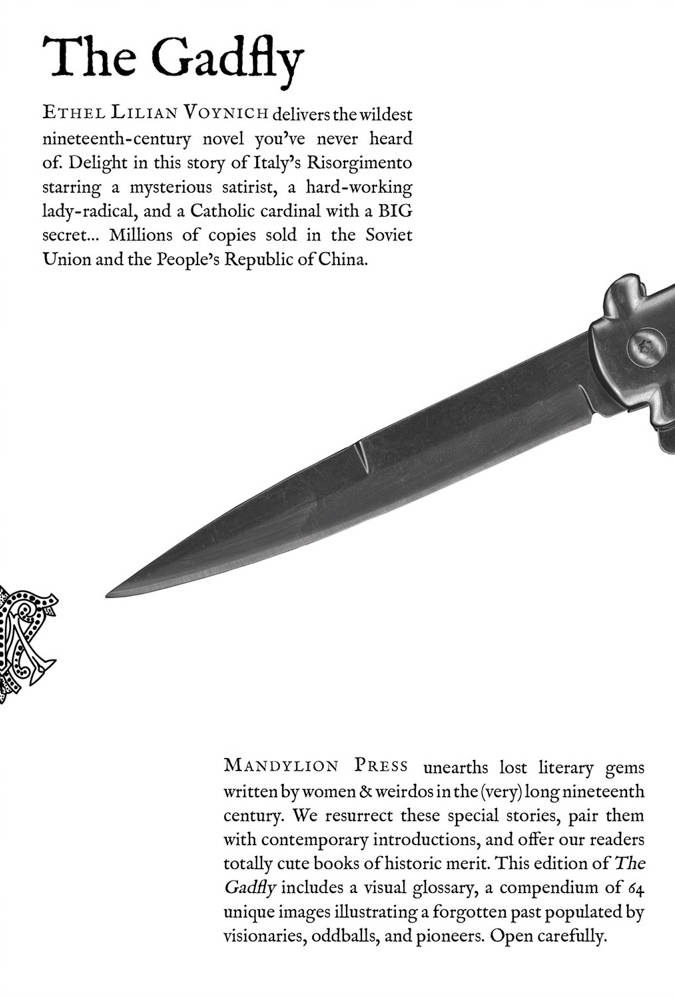
The Gadfly
Religion, love and revolution collide in this swashbuckling saga of Risorgimento Italy.
Set in Italy during the Risorgimento, The Gadfly is a thrilling tale of betrayal and revolution. It follows the adventures and misadventures of a mysterious satirist, a hardworking lady radical and a Catholic cardinal with a dark secret. Published in 1897 by Irish writer Ethel Lilian Voynich (or ELV, as she preferred to be known), The Gadfly sold millions of copies in the Soviet Union and the People's Republic of China, though it has been largely forgotten in the English-speaking world—until now. You'll laugh, you'll cry, you'll smuggle guns over the border and, if you're anything like the Gadfly, you'll do it all with incomparable style. Mandylion Press' second run of The Gadfly includes a new preface by Mandylion cofounder Madeline Porsella and a visual glossary illustrating the world of the novel.
Ethel Lilian (Boole) Voynich (1864–1960) was born in Cork, Ireland, and raised in Lancashire, England. Her peripatetic adult life was defined by passions for music and leftist politics. In 1902, she married Wilifrid Michael Voynich, a Polish revolutionary and antiquarian book dealer. She spent her final decades in New York City, where she worked in a music school and as a translator of Russian, Polish and French texts.
Edited by Mabel Capability Taylor, Madeline Porsella. Introduction by Madeline Porsella.
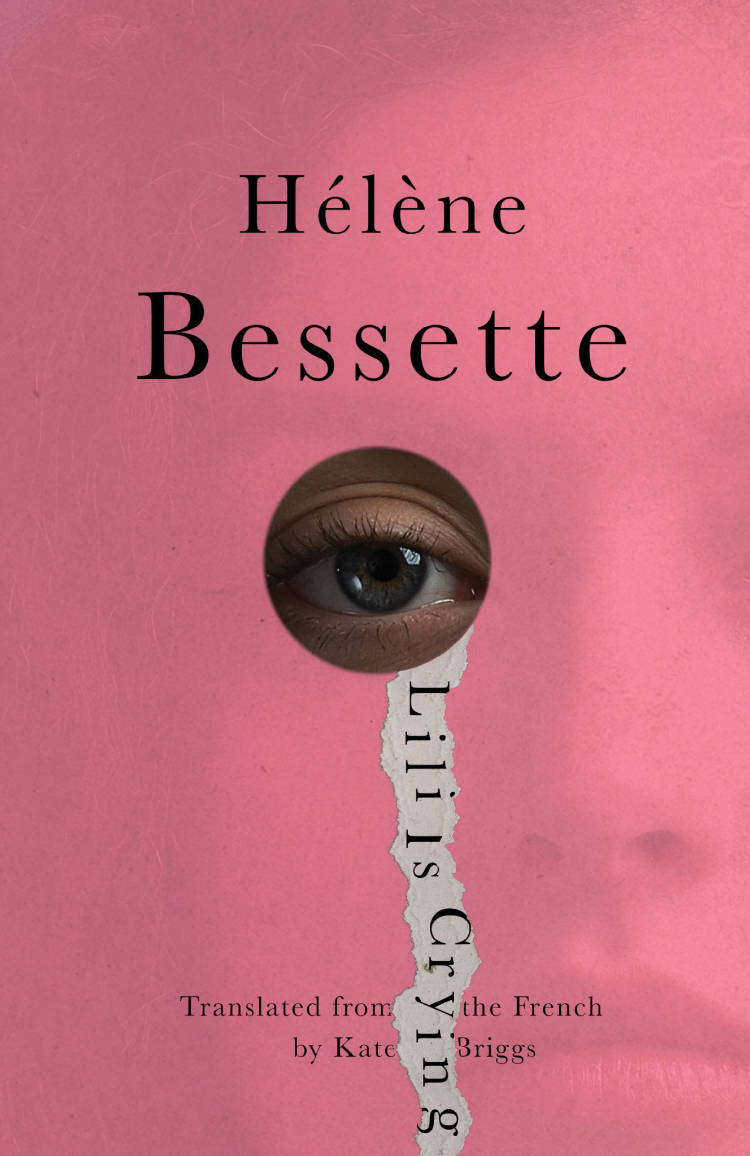
Lili Is Crying
A forgotten mid-century genius, recently rediscovered in France and never before translated into English, Hélène Bessette is a treasure and a bracing force to reckon with.
With a contribution by Eimear McBride
A New Yorker Best Book of 2025
Lili Is Crying, Hélène Bessette’s debut novel, conveys with singular force the fraughtness and depth of the troubling relationship between Lili and her mother, Charlotte. With a near-mythic quality, Bessette's stripped-back prose evokes at once the pain of thwarted love—of desire run cold—and the promise of renewal. Lauded by critics on its initial 1953 publication for its boundary-pushing style, Lili Is Crying catapulted Bessette to cult status in France. The novel is moving and maddening in turns, with its characters trapped in their own cruelties and sorrows, but in its spareness and strength it feels true. "Show me a woman who's chosen something." Bessette's books were hailed for their unusual economy of expression, rarity, strange humor, and sheer vivacity. She characterized her new kind of novel as "a freshly cut slice of life, whose force comes from its lack of commentary."
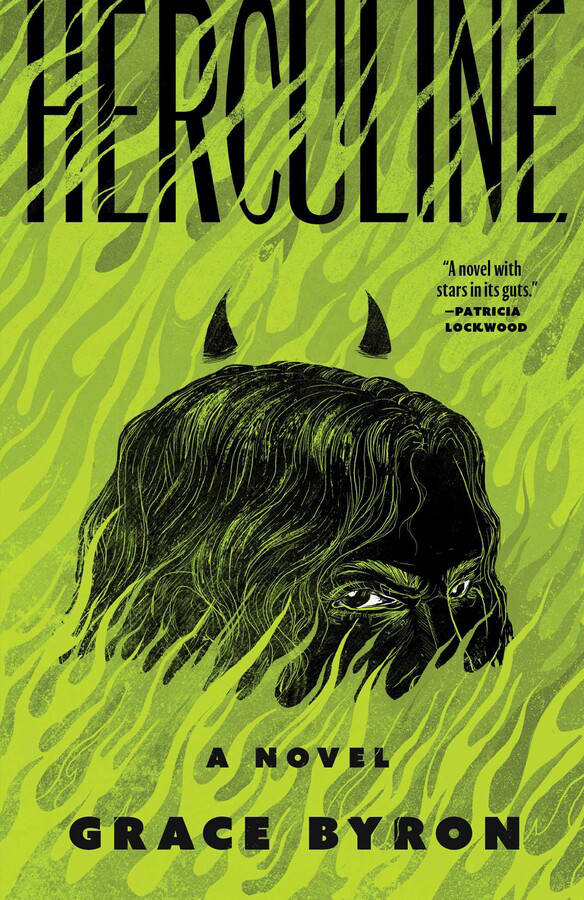
Herculine
A “witty, often-chilling, compulsively readable” (Vogue) horror debut following a woman who seeks refuge at an all-trans girl commune only to discover that demons haunt her fellow comrades—and she’s their next prey!
Herculine’s narrator has demons. Sure, her life includes several hallmarks of the typical trans girl sob story—conversion therapy, a string of shitty low-paying jobs, and even shittier exes—but she also regularly debates sleep paralysis demons that turn to mist soon after she wakes and carries vials of holy oil in her purse. Nothing, though, prepares her for the new malevolent force stalking her through the streets of New York City, more powerful than any she’s ever encountered. Desperate to escape this ancient evil, she flees to rural Indiana, where her ex-girlfriend started an all-trans girl commune in the middle of the woods.
The secluded camp, named after 19th-century intersex memoirist Herculine Barbin, is a scrappy operation, but the shared sense of community among the girls is a welcome balm to the narrator’s growing isolation and paranoia. Still, something isn’t quite right at Herculine. Girls stop talking as soon as she enters the room, everyone seems to share a common secret, and the books lining the walls of the library harbor strange cryptograms. Soon what once looked like an escape becomes a trap all its own.
While trying to untangle the commune’s many mysteries, the narrator contends with disemboweled pigs, cultlike psychosexual rituals, and the horrors of communal breakfast. And before long, she discovers that her demons have followed her. And this time, they won’t be letting her go.
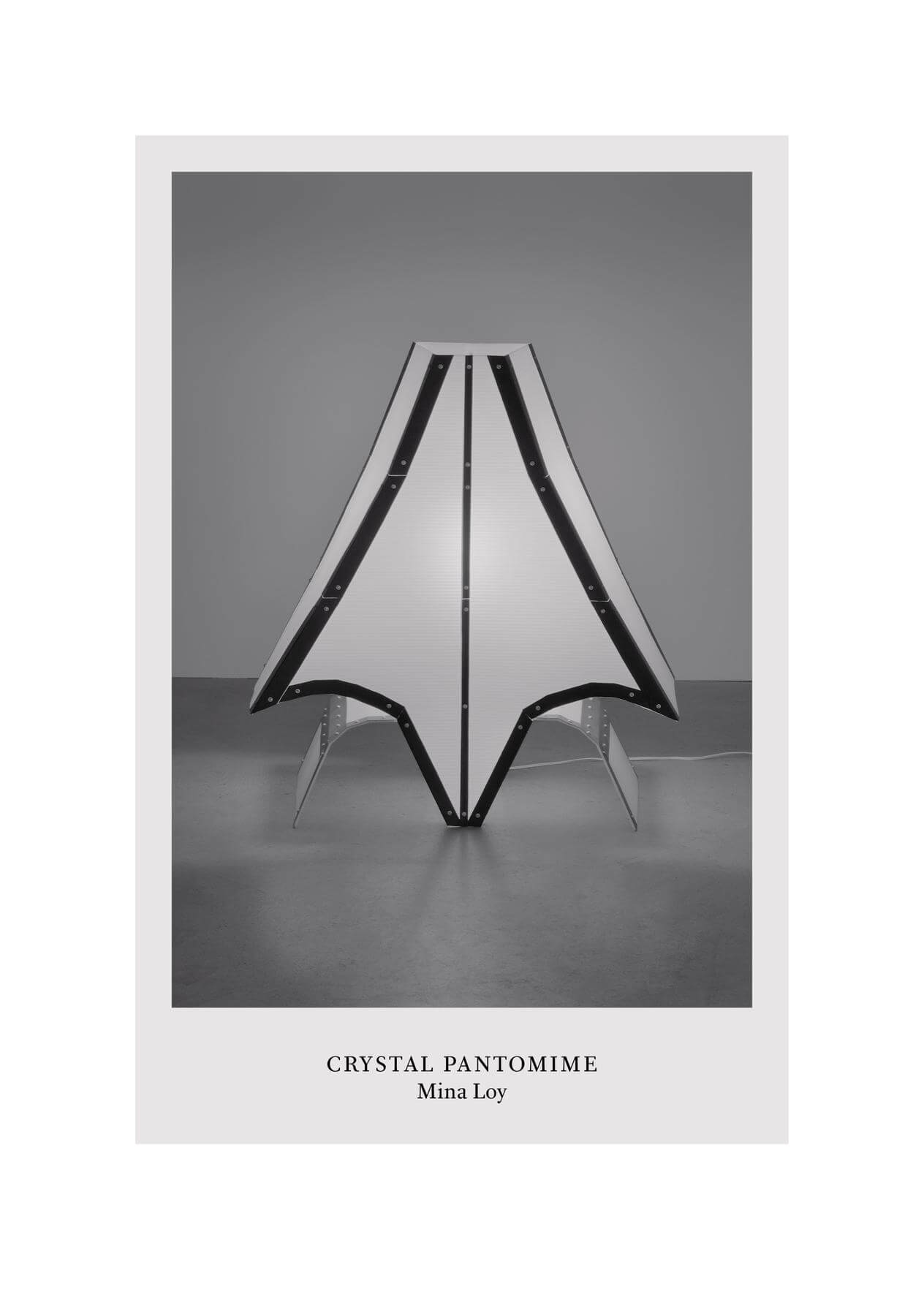
Crystal Pantomime
Recognized as a poet, less so as a visual artist […] Mina Loy also wrote in the style of Crystal Pantomime, a text from one hundred years ago [c. 1915] describing a ballet in prose. The writing evokes images with which actual theater effects can only interfere. It projects in the mind as onto a screen. But this restless writing does more than that, shifting registers and unfolded in equal parts fairy tale description, precise impossible stage directions, notes for impossible costumes and sets, guidelines for impossible choreography, and a glancing archeology of personal association, opinion, art historical commentary, and psychoanalysis, all floating in suspension, all shading into poetry, and with this manner of overflowing every frame defining its poetics. — Matthew Goulish
This first standalone edition of Crystal Pantomime opens with a biographical introduction by Mina Loy’s literary executor—poet Roger Conover—originally published in Eliot Weinberger’s journal Montemora in 1981, as well as a dramaturgical introduction by Matthew Goulish of Chicago performance group Every house has a door, originally prepared as opening remarks to Every house’s reading of Loy’s Pantomime at the Arts Club of Chicago in spring of 2024. In tandem these supplementary texts begin to frame what is a rather strange and singular sketch for a work never realized.
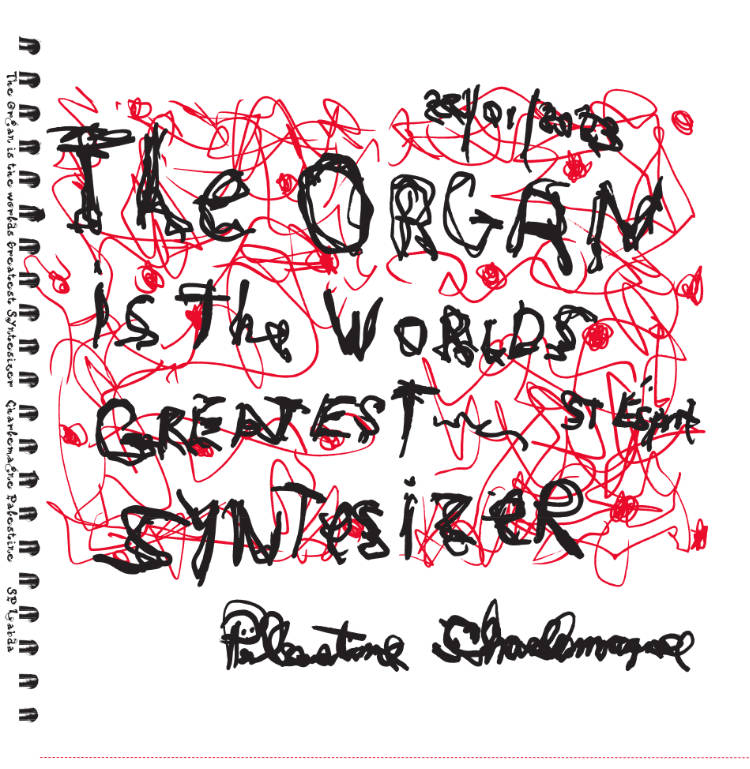
The Organ is the World's Greatest Synthesizer (vinyl LP)
Recorded live at Amsterdam's Oude Kerk during the 2024 Sonic Acts Festival, The Organ is the World's Greatest Synthesizer finds Charlemagne Palestine returning to the Staalplaat catalog after many years. Taking its title and cover from a drawing made by Palestine during the performance, the work expands his singular mythology of sound and spirit. Opening with resonating bells and falsetto overtones before surrendering to the vast sonic tides of the church organ, the 40-minute piece unfolds as an ecstatic continuum—tones intertwining, frequencies colliding, and space itself becoming an instrument. A testament to the living dialogue between artist, instrument, and place, this is Palestine at his most immersive and transcendent.
For over six decades, Charlemagne Palestine has been a pioneering composer, performer, and multimedia artist, celebrated for his ecstatic sonic explorations and ritualistic, metaphysical performances. Emerging from the cross-disciplinary New York art scene of the 1960s and '70s, he helped shape a heretical edge of minimalism alongside figures like Conrad, Riley, Niblock, and Glass. Trained as a Jewish cantor and later as the carillonneur at St. Thomas Church, Palestine cultivated a deep fascination with resonance and overtone—an obsession that evolved through his use of percussion, early synthesizers, and monumental piano works, influencing artists from John Cale to Nick Cave.
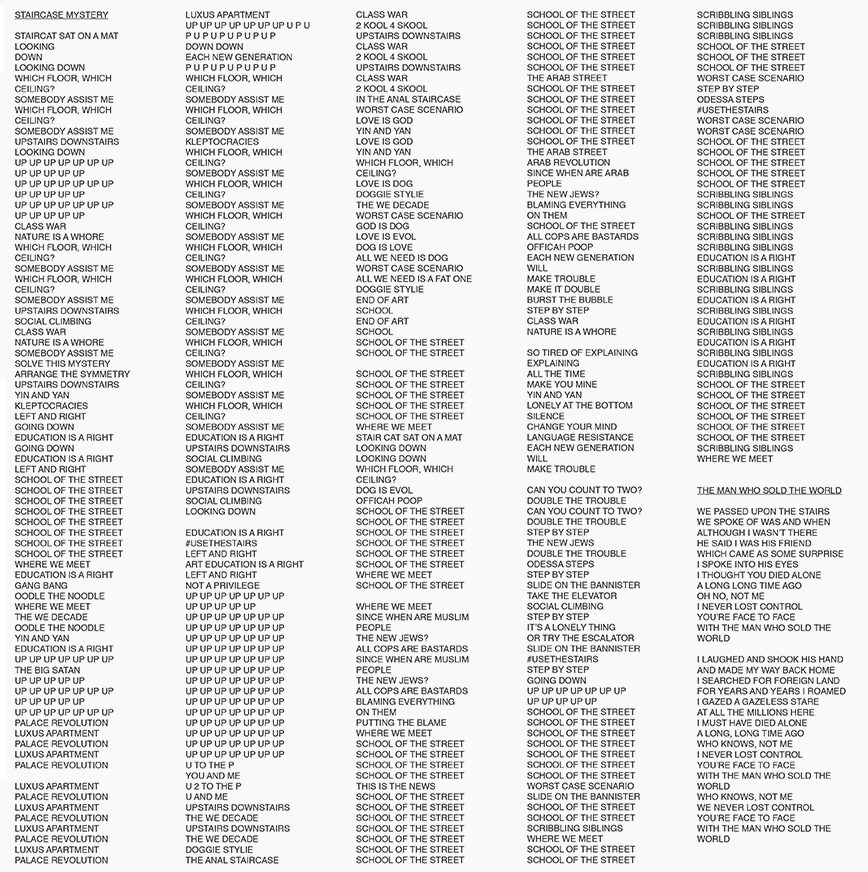
Staircase Mystery (LP)
An oral performance (concept, texts and voice by Karl Holmqvist).
Newspaper articles, snippets of conversation and pop lyrics form a textual mesh and merge into a variety of forms in dealing with text and its decoding and recoding. The text sometimes allows the quoted sources to stand out clearly and at other moments concentrates on the original qualities of the language.
Karl Holmqvist reads his poems in his distinctive lilting monotone way. He unterstands reading poetry as a form of visual art: as a form of invisible visual art, or as a form of Everyman's visual art. He is interested in poetry as a vehicle for communicating with and between people.
Recorded at Centre d'Art Contemporain Genève and in Karl Holmqvist's studio in Berlin.
Karl Holmqvist (born 1960 in Västerås, lives and works in Berlin and Stockholm) is a Swedish artist and poet whose work explores language as a sculptural and performative medium. Known for his text-based pieces, readings, and installations, he reconfigures language into rhythmic, often hypnotic compositions that unfold across performance, print, video, and object-based formats. Drawing on pop culture, protest, and poetry, Holmqvist transforms everyday language into visual and sonic material—blurring the boundaries between reading, speaking, and listening. His distinctive voice and approach invite audiences to encounter language not just as communication, but as energy, structure, and presence.
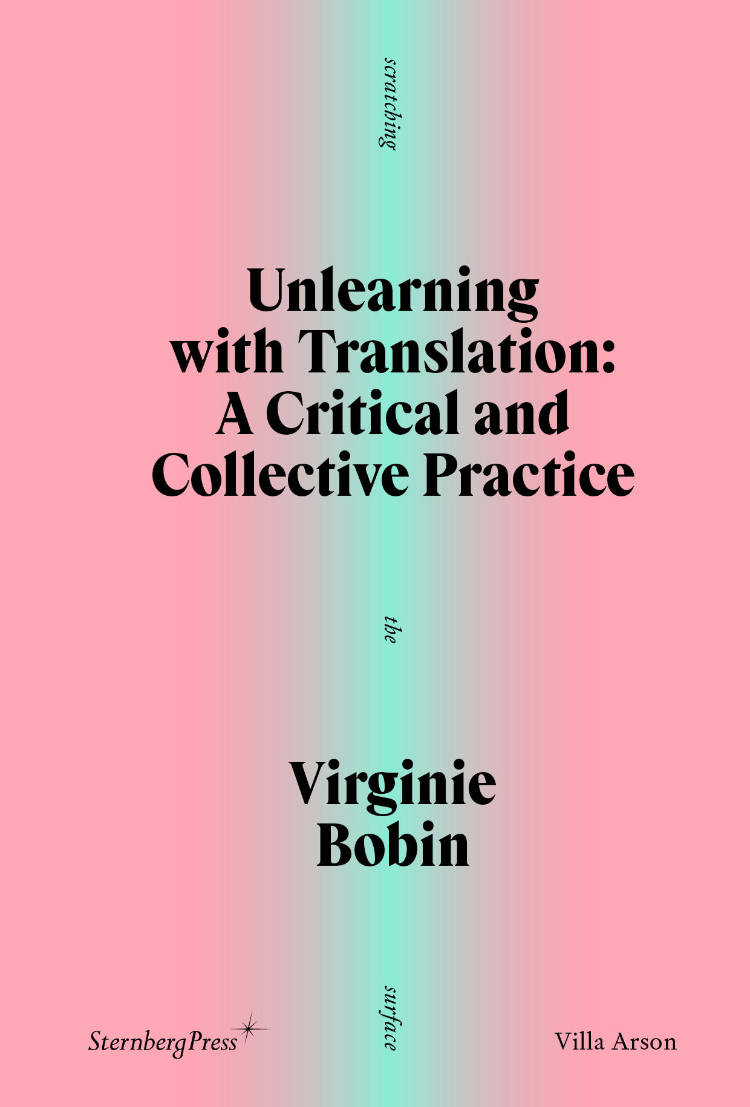
Unlearning with Translation – A Critical and Collective Practice
The act of translation as a pedagogical tool, a political act, and ultimately a gesture of care in these tense cultural times.
Based on practical experiments, Unlearning with Translation posits the act of translation as a pedagogical tool, a political act, and ultimately a gesture of care in these tense cultural times. Written by French curator, writer, editor, and self-taught translatress Virginie Bobin, the essay revisits a series of workshops, exhibitions, and other collective activities that took translation as both subject and method to unsettle entrenched conceptions of language, identity, and belonging. In particular, the ambiguous notion of "untranslatability" is used as a lens through which to examine the power relations at play in those institutional, economic, and political contexts inhabited by art workers. Alongside collaborations with artists including Mercedes Azpilicueta, Serena Lee, and Mounira Al Solh, Bobin's reflections are grounded in her experience co-founding and facilitating the editorial and curatorial platform Qalqalah قلقلة†, which relies on translation as a tool for the production and publication of situated knowledge in three languages—French, Arabic, and English. Informed by feminist genealogies and methodologies throughout, the book maintains that collective labor and relations are key aspects of any critical practice, as exemplified in the concluding correspondence with Andrea Ancira.
Virginie Bobin operates across research, curatorial and editorial practices, writing, pedagogy and translation, with a particular interest in performance, experimental forms of artistic research, the role of art, artists and art institutions in the public sphere, and formats that exceed that of the exhibition. Between 2009 and 2018, she has worked for various art centers and residency programs (Villa Vassilieff, Bétonsalon, Witte de With, Les Laboratoires d'Aubervilliers, Performa). She is a Doctor in Artistic Research (PhD-in-Practice, Academy of Fines Arts, Vienna, 2023), a professor in Art and Social Practices at ésadhar (Rouen, since 2024), and a co-founding member of the editorial and curatorial platform Qalqalah قلقلة. In addition to her contributions to various international journals, she has edited the collective publications Composing Differences (Les presses du réel, 2015), Republications (with Mathilde Villeneuve, Archive Books, 2015), and Bestiario de Lengüitas (with Mercedes Azpilicueta, k.verlag, 2024).
Edited by Alice Dusapin and Sophie Orlando.
Contribution by Andrea Ancira.
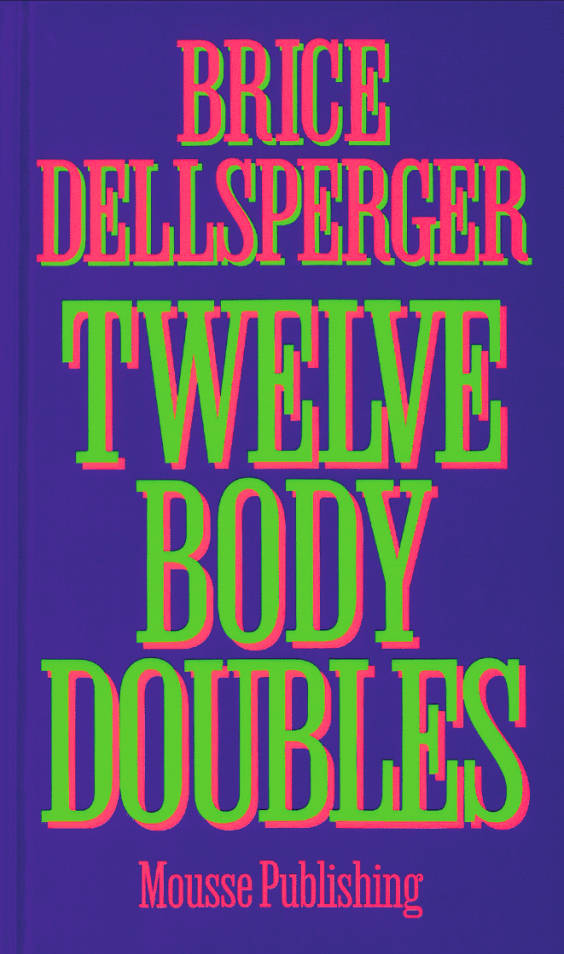
Twelve Body Doubles
An overview of the French artist's film remakes over a decade.
"There's something deeply unsettling about the fact that Brice Dellsperger has spirited Laura Palmer away and replaced her with a doppelganger."—Evan Moffitt
Since 1995, the French artist Brice Dellsperger has been working on remakes of cult film sequences, which he has collected under the generic title "Body Double." The doubling of the actor or actress playing all the characters, both female and male, involves cross-dressing and raises questions about gender, originality and artifice. This book covers a decade and brings together video stills from his twelve most recent films, Body Double 29 (2013) to Body Double 40 (2024), with texts by Evan Moffitt and Rebekka Seubert and views of his latest exhibitions.
Brice Dellsperger (born 1972 in Cannes, France, lives and works in Paris) pushes the boundaries of genre and gender. In his multifaceted reprises of iconic film sequences—all assembled under the generic title Body Double—the cineast and artist reenacts the selected scenes frame for frame and lets his “body doubles” perform all of the roles, be they male or female.
Brice Dellsperger has exhibited extensively in Europe and abroad, and began his well-known Body Double series in 1995. His work is in collections that include the Museum of Modern Art, Musée d'Art Moderne – Centre Pompidou, and the Nouveau Musée National de Monaco.
Texts by Evan Moffitt and Rebekka Seubert.
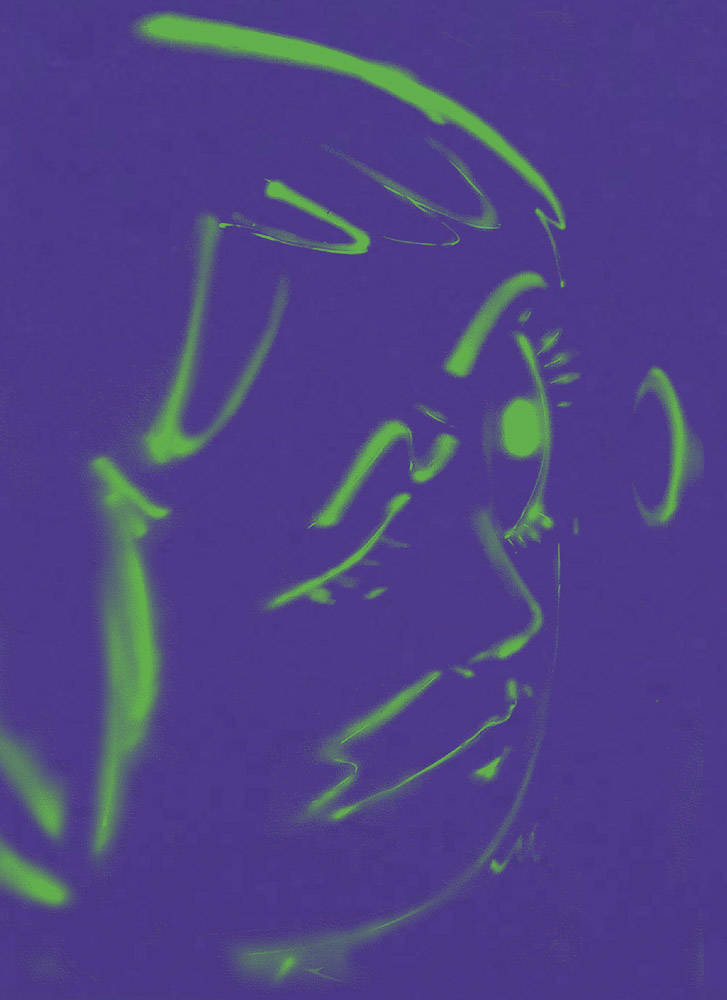
Slipping on Fragmented Shapes
First monograph devoted to the playful, explosive and colorful paintings of the Iranian artist, featuring extensive illustrations along with a selection of drawings and preparatory studies that reveal the methods behind Hoda Kashiha's compositions, which are often constructed like collages, in which multiple layers intersect, cut-out shapes emerge, and images evolve through a combination of hand-drawing and digital manipulation.
Published following the exhibition I'm Here, I'm Not Here at Passerelle Centre d'Art Contemporain, Brest, in 2022, Hoda Kashiha's first solo public exhibition in Europe.
Developing a distinctive form of pop painting that moves freely between uninhibited Cubism and a cartoon-like visual language, Iranian artist Hoda Kashiha (born 1986 in Tehran) produces works that appear playful at first glance but reveal darker, more enigmatic, and deeply symbolic layers upon closer examination. Humour is a recurring strategy in her practice—one that fosters intimacy with viewers while enabling her to address serious and sensitive questions rooted in the social context and political climate of her home country. Her paintings also engage universal concerns, including gender relations and the place of women in society. For Kashiha, her protagonists become activists without ever speaking: they assert their differences openly and remain steadfastly optimistic. With her exuberant use of forms and colour, Kashiha creates an explosive blend of genres in which Picasso seems to drift into the world of Minecraft, joyfully dismantling the conventions of the past.
Text by Lilian Davis; conversation between Loïc Le Gall and Hoda Kashiha.